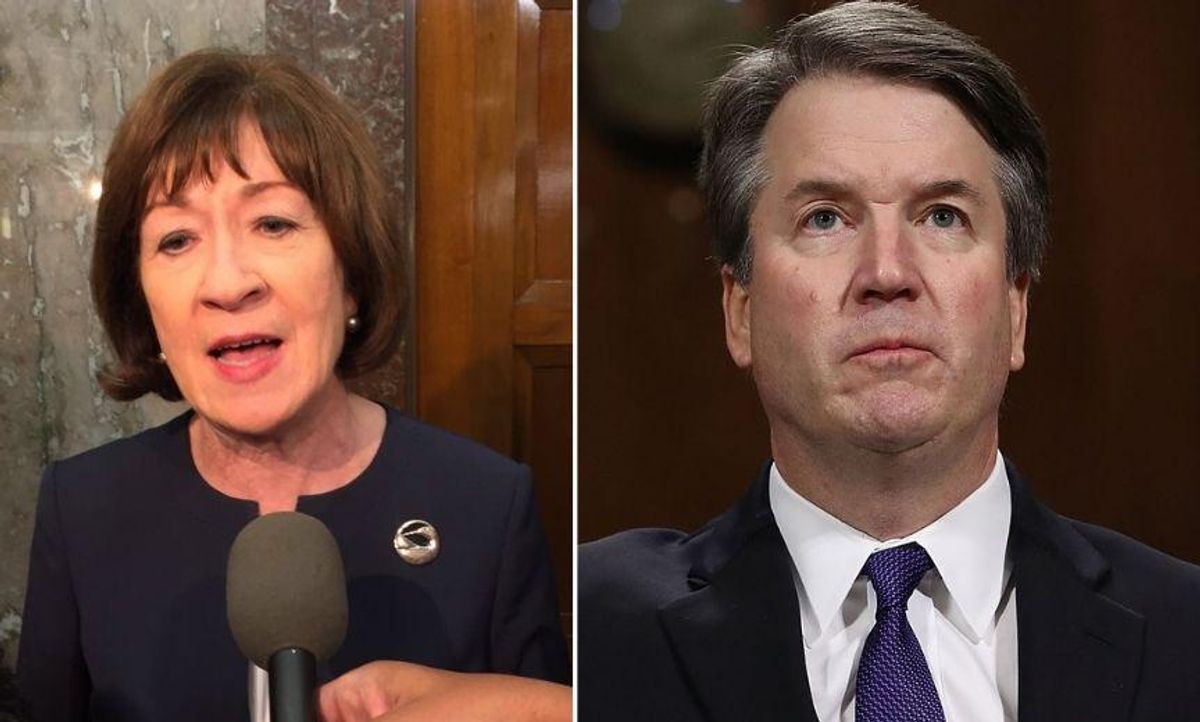Supreme Court Justice Brett Kavanaugh's 2018 confirmation process was one of the most contentious in recent history, as allegations of sexual assault and fears of his conservative leanings led even Republican senators to doubt his readiness for the lifetime appointment.
A key hope for Democrats to upend Kavanaugh's confirmation was moderate Republican Senator Susan Collins of Maine, who suggested she wouldn't vote to affirm Kavanaugh unless he committed to the position that Roe v. Wade—the landmark 1973 case that established pre-viability abortions as a constitutional right—was settled law.
After a meeting with Kavanaugh, Collins assured he met that standard.
In a speech before the Senate supporting Kavanaugh's nomination, Collins said:
“To my knowledge, Judge Kavanaugh is the first Supreme Court nominee to express the view that precedent is not only a practice and a tradition, but rooted in Article 3 of our constitution itself ... When I asked him, ‘Would it be sufficient to overturn long established precedent if five current justices believed that it was wrongly decided, he emphatically said, ‘No.'"
Flash forward to Wednesday, December 1, when the Supreme Court heard arguments in Dobbs v. Jackson Women's Health Organization, a case challenging Mississippi's ban on most abortions after 15 weeks—nine weeks before the viability standard established in Roe v. Wade and upheld in Planned Parenthood v. Casey.
Throughout the arguments, the Court seemed poised to uphold Mississippi's ban. Justice Amy Coney Barrett suggested that abortion bans don't impose parenthood, since pregnant people can put babies up for adoption or release them at dropoff centers.
For his part, Kavanaugh seemed to downplay the importance of precedent in regards to Roe v. Wade, decimating Collins' 2018 assurance that Kavanaugh was too deferential to precedent to ever overturn such a formative case.
Kavanaugh downplayed the importance of stare decisis, or the legal principle that precedent should be considered before ruling on litigation:
"[H]istory helps think about stare decisis, as I've looked at it, and the history of how the Court's applied stare decisis, and when you really dig into it, the history tells a somewhat different story, I think, than is sometimes assumed."
The Justice then proceeded to recite a litany of cases, such as Brown v. Board of Education and Obergefell v. Hodges, which overturned precedent.
He added:
"In each of those cases -- and that's a list, and I could go on, and those are some of the most consequential and important in the Court's history -- the Court overruled precedent. And it turns out, if the Court in those cases had listened ... the country would be a much different place."
Justice Sonia Sotomayor countered this position, noting that the cases he listed didn't expand the state's rights over individuals, as the Mississippi abortion law does:
"Of all of the decisions that Justice Kavanaugh listed, all of them invite -- virtually, except for maybe one, involved us recognizing and overturning state control over issues that we said belong to individuals."
Nevertheless, Kavanaugh's questions suggest he's content overturning decades of precedent to uphold pre-viability abortion bans and gut Roe v. Wade.
It wasn't long before a 2018 highlighting Collins' comments on the matter resurfaced.
NEW BREAKING: Sen. Collins just said Kavanaugh told her he agrees w Roberts' take on Roe V Wade - that it is settled law. pic.twitter.com/YGk8P5n8db
— Lisa Desjardins (@LisaDNews) August 21, 2018
People were enraged at the Senator's lack of foresight.
SCOTUS nomination hearings are a joke.
We pretend throwing around concepts like "settled law" tells us anything about how Kavanaugh will approach abortion.
Yes, Roe is SETTLED until Kavanaugh UNSETTLES it. https://t.co/JV2GBs7aFb
— Judd Legum (@JuddLegum) December 1, 2021
There is no middle ground in these fights, if you play the middle you get ran the hell over.
Senator Collins is learning that today, because this was a lie. https://t.co/I012iDsMB4
— Nina Turner (@ninaturner) December 1, 2021
Didn't age well. https://t.co/9SOl9CLOEx
— 🌲Andy 👣from 👣Oregon🌲 (@AndrewFmOregon) December 1, 2021
That was a lie, and she either knew that & was complicit in promoting that lie OR she was bamboozled into thinking that Kavanaugh was going to to about-face on the entirety of his judicial philosophy.
Either way, she doesn’t deserve to hold elected office. Maine can do better. https://t.co/R7fSjrawEm
— Fredrick Doss (@FredrickDoss) December 1, 2021
Turns out that @SenSusanCollins is either a breathtakingly naive dupe or was actively lying the whole time. https://t.co/fdAQodiRp2
— OpinionatedKyle (@jazzmankyle) December 1, 2021
Want to write something witty here but my white hot rage is preventing me from thinking clearly. https://t.co/nZ5Yv6emez
— Dave D | Link Clicker 🦃 (@trickybuddha) December 1, 2021
Others speculated this was Collins' intention all along.
She’s not that naive and don’t let her pretend like she is https://t.co/bRxIp7u8pd
— Joyferatu (@capnjoy) December 1, 2021
Susan Collins wasn't duped. She's a fraud. https://t.co/umOQFZlHXz
— Jamal Raad🌲 (@jamalraad) December 1, 2021
I know we’re dunking on here for this but she didn’t get tricked. She has always wanted Roe overturned. She knew what she was doing. It’s the people in Maine who voted for her that got duped. https://t.co/nvS6KM6t9C
— Danny Barefoot (@dannybarefoot) December 1, 2021
The nation waits with baited breath for the verdict.
 SECONDNEXUS
SECONDNEXUS percolately
percolately georgetakei
georgetakei comicsands
comicsands George's Reads
George's Reads








